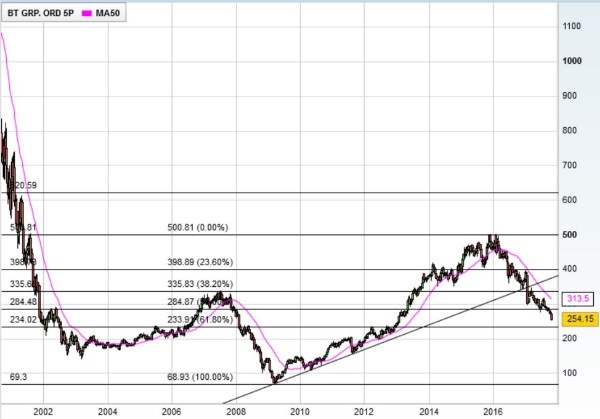Why BT shares could keep falling
2nd November 2017 13:16
by Graeme Evans from interactive investor
Share on
It was a familiar story for beleaguered investors today as another set of lacklustre results kept shares in the embattled telecoms giant at a five-year low. A glance at the charts suggests another lurch lower could be on the cards.
A 10% drop in sales at BT's troubled Global Services arm ensured group revenue and profits for the second quarter were down 1% at £5.9 billion and £666 million respectively.
There was some consolation in the shape of the EE mobile network's impressive performance, as well as the fact that full-year forecasts were unchanged and the half-year dividend maintained at 4.85p.
But even then, there was confusion for shareholders as BT said next year's half-year dividend will be fixed at 30% of the previous full-year award.
Taken together, it was little wonder that BT's share price sagged another 3% to 253p today, its lowest level since early 2013. Two years ago, shares touched 500p - but that was before an accounting scandal at its Italian business and a host of uncertainties about regulatory and pension deficit issues.
The chart below highlights Fibonacci retracement levels of the rally from March 2009 low to February 2016 high. Next obvious technical support for BT shares, according to this chart, is at around 234p. Currently, there appears no clear catalyst to prevent such a move.

Investors will be hoping that City grandee Jan du Plessis, who has replaced former CBI president Sir Mike Rake as chairman, can oversee a change in fortunes.
There's plenty for du Plessis to consider, not least the position of chief executive Gavin Patterson in light of the significant weakening in shareholder value. The chairman has spoken publicly of his support for Patterson, who has spearheaded BT's expensive entry into the TV sports market.
A defining moment for the pair will come early next year when BT faces up to Sky and others in the next auction of Premier League football rights. There's also the pressing issue of what to do with Global Services, which employs about 17,000 people serving multinational companies in 180 countries.
The division, which has been beset by challenging market conditions as it attempts to exit low margin business, reported a 39% drop in second quarter earnings to £81 million.
In the summer, it emerged that BT had called in consultants from McKinsey to conduct a review of its entire business. One option under consideration is likely to involve hiving off the more valuable UK part of the Global Services operation and merging it with its Business and Public Sector arm. This might then lead to the sale of some of the foreign operations.
BT's core consumer division grew revenues by 1% in the second quarter, but operating costs rose 2%, partly as a result of additional sports rights from the Premier League, Box Nation and its Ashes cricket coverage.
The TV customer base grew by 7,000, compared with 63,000 a year earlier, to 1.8 million. Average viewing figures for BT Sport were up by 8% on the previous year, driven by strong interest in UEFA Champions League action.
The BT Consumer and EE divisions will run as one business from the next financial year. In the meantime, EE recorded its fourth consecutive quarter of growth, with revenues up 4% to £1.3 billion and underlying earnings ahead 16% to £326 million. BT bought the EE business for £12.5 billion last year.
This article is for information and discussion purposes only and does not form a recommendation to invest or otherwise. The value of an investment may fall. The investments referred to in this article may not be suitable for all investors, and if in doubt, an investor should seek advice from a qualified investment adviser